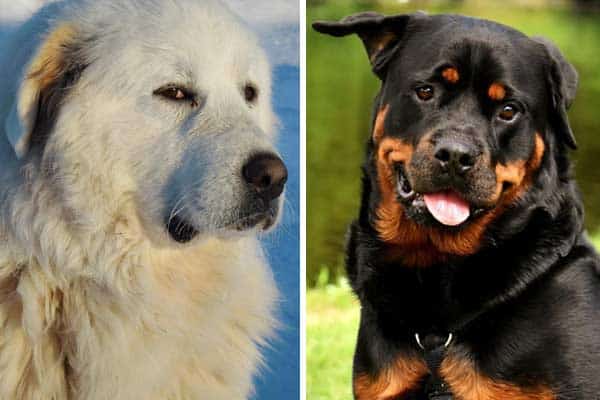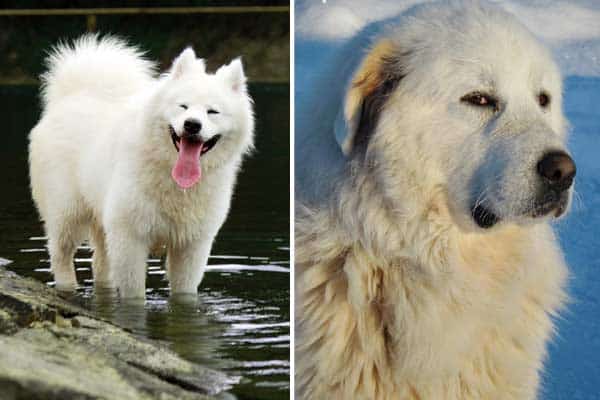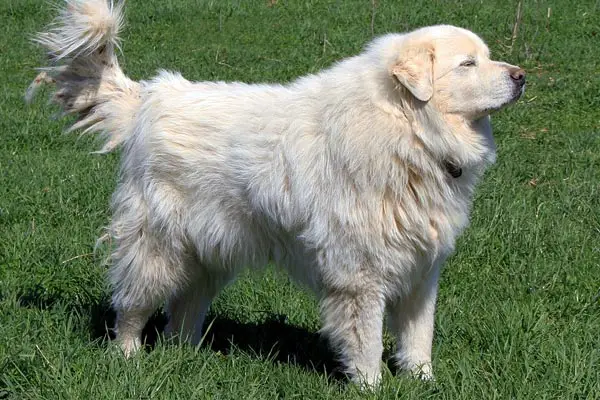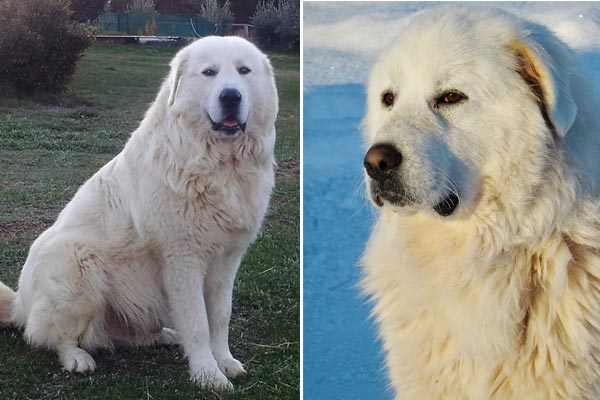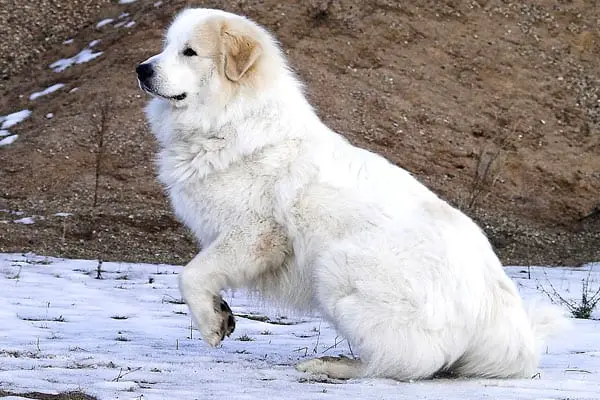Are Great Pyrenees Smart: Why This Big Dog Isn’t All Brawn
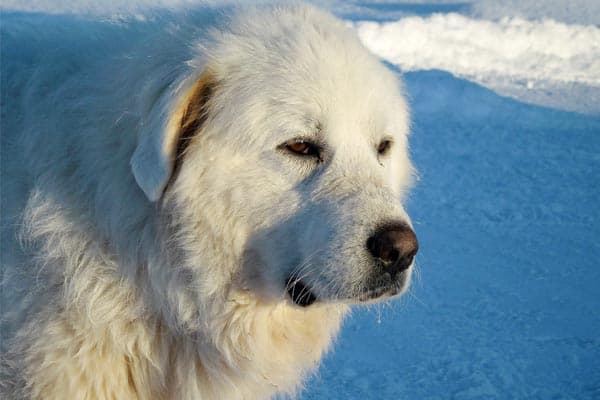
The Great Pyrenees dog is better known for its brawn rather than its brains.
However, this is only because Great Pyrenees have spent thousands upon thousands of years working through very difficult weather conditions to protect livestock from dangerous predators.
In short, Great Pyrenees dogs were not bred to be lap dogs, “pet” dogs, or companion canines.
This dog breed arose and evolved to work hard, long hours at a dangerous and sometimes deadly job – and has done so faithfully since ancient times. In their element, there is no animal smarter and stronger and braver than a Great Pyrenees.
But in a pet setting where these working dogs don’t have a job to do, they can unfairly get branded as stubborn or (even worse) dangerous. In this article, we learn the real story of the Great Pyrenees intelligence.
Are Great Pyrenees Smart
As Science Alert highlights, the Great Pyrenees is currently ranked in 64th place for canine intelligence.
This might seem fairly impressive until you consider that only 79 purebred dog breeds were assessed.
But there is more to this story than a simple ranking of dog smarts
Actually, this particular assessment looked at only one type of canine intelligence.
Learn About the Great Pyrenees Dog Breed
This YouTube video offers a great breed overview and introduction to the Great Pyrenees so you can learn more about these wonderful dogs.
As you will learn, the “Pyr” (as owners and fans of the breed often call them) has a long and noble history working and serving alongside people.
What Type of Intelligence Does the Great Pyrenees Dog Have
As the American Psychological Association (APA) explains, just as there are many types of human intelligence, there are many different types of canine intelligence.
One of the leading experts on the subject, Stanley Coren, Ph.D., explains that there are three main categories of canine intelligence.
Different dog breeds will exhibit different categories depending on their genes and the type of work they have been bred to do.
The three basic types of canine intelligence are as follows.
1. Instinctive intelligence
Instinctive intelligence is another way to say instinct to behave in certain ways. This refers to what type of work a dog breed was developed to do.
In the case of the Great Pyrenees dog breed, as the American Kennel Club (AKC) points out, this dog breed was always intended to be a guarding dog.
The Great Pyrenees dog breed dates all the way back to 3,000 B.C. to the time of ancient farmers who lived and worked in the Pyrenees mountain range that divides Spain and France.
Biologists have found fossil remains indicating that the Great Pyrenees guarded the Basque people, who descended from the Cro-Magnon people. These dogs have been faithfully guarding humans for millennia.
Interestingly, the Great Pyrenees dog has always had the job of guarding both the people and their livestock. In the case of the latter, the Great Pyrenees had to ward off major predators like bears and wolves.
Any dog doing this difficult job would have to be independent, able to think on their feet, brave, with high pain tolerance, and an extremely strong guarding and protective instinct. Also, this dog would have to be very strong and powerful.
2. Adaptive intelligence
Adaptive intelligence is another type of intelligence that the Great Pyrenees scores quite high in.
In the previous section here we mentioned that the Great Pyrenees was bred to guard livestock. Often there were large herds of sheep spread out over a great distance. This could mean the dog would have to make decisions when far away from the farmers.
Adaptive intelligence measures how well a dog breed could carry out its job functions when separated from people. The dog would be required to learn on their feet and get creative about how to solve difficult problems.
One example of this is how the Great Pyrenees breed has actually evolved to be nocturnal in many respects. Since the predators would often try to poach animals from the flocks at night, the dog would have to stay awake to guard them.
3. Working and obedience intelligence
It is this third type of intelligence that the study we mentioned here in an earlier section was measuring – the ability of a dog breed to learn and recall a specific command in less than five tries.
The closest human example of this would be a student who excels in school. Dog breeds that are able to learn new tricks and master them quickly and repeat them reliably will score quite high in working and obedience intelligence.
But these dog breeds may not do as well when left on their own at night to keep a herd safe from a hungry wolf or a bear.
So rather than assume that a Great Pyrenees dog is not as smart as a Border Collie just because the latter is better at learning tricks is to discount the intelligence of both dog breeds.
The Great Pyrenees Is a True Guardian Dog Breed
It is one thing to say a canine makes a good guard dog. It is quite another to say that the dog is a great guardian.
As the Great Pyrenees Club of America explains, these dogs are beloved around the world for going above and beyond the call of basic guard dog duties.
The Great Pyrenees is a true guardian dog who seems to have a sixth sense for distinguishing between friendly or neutral situations and true threats.
The Great Pyrenees is a popular choice for a wide variety of roles with one thing in common: the dog is a caretaker to people.
From family guard dog to service dog, therapy dog to rescue dog, these dogs display an ability to empathize and nurture the young, the elderly, the ill, and the fearful.
It is a rare dog breed indeed that would be the focus of an annual guided tour!
The Great Pyrenees dog is the featured breed for the Institute for the Science of Origins annual trip to the Pyrenees mountains.
During the tour, participants will actually get to walk a route with local shepherds to see how they move sheep safely.
Another highlight of the trip is the Festival of Pyrenean Dogs and Folklore and visits to several local Pyrenees dog breeders and even the chance to participate in a Great Pyrenees dog walk.
Great Pyrenees Dogs Are Not Happy Without Someone to Protect
The Great Pyrenees dog has such strong instinctive and adaptive intelligence that these dogs are literally miserable when left alone for any length of time.
As Vetstreet explains, the Great Pyrenees is going to be a guarding and protection dog whether trained or not and whether needed or not.
This means the Great Pyrenees can easily become destructive and difficult to manage without steady and consistent obedience training and a clear job description.
These dogs cannot turn off their instinct to look for potential threats and their innate tendency to keep their own counsel about how to respond to such threats.
If a training command doesn’t make sense to a Great Pyrenees, or if the dog thinks another response would be more appropriate, you may find yourself in a battle of wills with your own dog.
This is not, as the intelligence study we referenced earlier suggests, mean your Great Pyrenees is stupid.
It just means these dogs have a form of intelligence that relies on independence and instinctive problem-solving rather than the unquestioning obedience of their people.
Great Pyrenees Smart Versus Stubborn
As the Great Pyrenees Rescue of Greater Chicago points out, all too often the Pyr’s particular brand of intelligence gets mislabeled as stubbornness.
Similarly, a Great Pyr’s territorial and protective instincts can get mislabeled as aggressive.
And a Pyr’s natural drive to roam and wander and explore – as these dogs would naturally do when protecting and guarding a huge herd of sheep or goats – is quite frequently mislabeled as untrustworthiness when off the leash.
The truth is, the Great Pyrenees in their natural working element would never be on a leash in the first place. Their strength and territorial instincts would be celebrated and relied upon, not criticized.
And their insistence on following their own instincts would be saving the lives of both livestock and people rather than being called stubborn.
How to Keep a Smart Great Pyrenees Dog Happy
Even if you have no need for a dog to herd and guard your sheep, there are plenty of ways to engage your Great Pyrenees dog’s brain as well as body.
These dogs are great canine athletes that excel in sports like drafting, search and rescue, and obedience trials.
They are fabulous therapy and service dogs in a variety of disciplines, from guide dogs to medical aid dogs.
A busy Great Pyrenees dog is going to be a happy, well-behaved dog.
